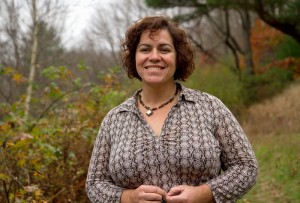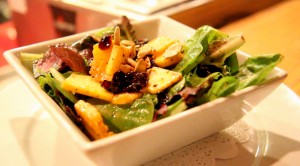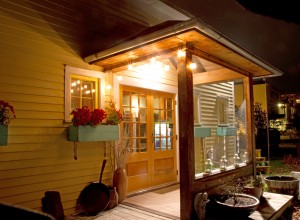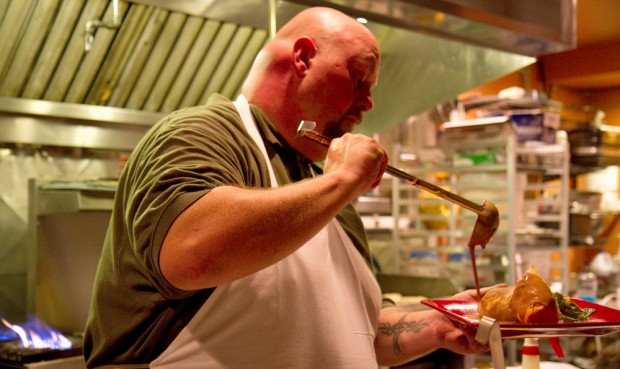Shale Country Restaurant Provides Haven from Polarized Gas Debate
-
Susan Phillips
When you drive north on route 29 in Susquehanna County, just before you hit the traffic light in downtown Montrose, sits a restaurant that’s easy to miss. The Summerhouse Grill welcomes diners from the back door. Inside, it’s a surprisingly bustling and busy room. Everyone here seems to know one another. After all, only about 43,000 people live in Susquehanna County as a whole.
The benefits and disadvantages of gas drilling are widely debated. But one thing everyone agrees on, is that drilling has brought tension to small rural communities. Susquehanna County is home to Dimock, a town that has become synonymous with flaming taps and everything that could possibly go wrong when the gas drillers come to town. And where friendly neighbors no longer speak to one another. But in the center of Susquehanna County one woman tries to heal those divisions over a good plate of food.
The woman behind all of this is Kim Glemboski. She grew up with her artist parents on a small farm outside of town. Today, she’s neither a farmer, or the restaurant’s cook. Glemboski is actually an author and historian, and she’s steeped in knowledge about the area’s rich heritage.
“All of the different resource extractions that have happened here,” says Glemboski, “from tanning, from timbering, agriculture, coal mining, and this is just chapter 31, here we go again.”
Glemboski used to organize historical tours of Northeast Pennsylvania, an area that once housed a thriving free slave population. It’s also a region where battles over natural resources has a long history. Glemboski speaks with authority on the Pennamite-Yankee wars that waged in this area of the state for 30 years in the late 1700’s, when land granted by English Kings, to two different sets of settlers, resulted in violent skirmishes.

Summerhouse Grill owner and manager, Kimberly Glemboski, tries to make her restaurant in Montrose, Pa. a place of common ground for both sides of the natural gas debate.
Historian Becomes Restauranteur
Glemboski took over the Summerhouse Grill several years ago, with a vision to create a true farm-to-table restaurant that tries to use as many local ingredients as possible. She also wanted to create a kind of demilitarized zone, in the current “wars” over gas drilling. Some customers refer to her as the “UN Peacekeeper” of the gasland.
“We measure ourselves on where we stand on this particular issue and we divide ourselves by that,” says Glemboski. “And if we can find one way to connect over a really good chicken or just an astonishing plate of trout that was grown with love and with care, I’m not trying to be Pollyanna, but I think it’s important to find little crevices where we can put our fingers in and say hey, we’re common in this way.”
When it comes to gas drilling in Northeastern Pennsylvania, there are a lot of divisions.
The night I end up at the restaurant happens to be “sausage and beer” night. The sausage is homemade by locals, and the beer is from a new micro-brewer just down the road.
Gas, Food and Fun This Exit
A guy sporting dreadlocks is pouring beer. His name is John Puzo. And he grew up not far from this restaurant, on his family’s 5th generation dairy farm.
“I’m just a beer lover, a lover and drinker,” Puzo tells me. “A romancer. Yeah.”
Puzo says he’s never milked a cow in his life. Instead, his mother wanted him to study music. He went to art school and became a building designer. He says business is booming.
“Wicked good,” says Puzo. “I already had 90 jobs this year.”
When I ask him why, he looks around furtively to see if anyone’s listening.
“Can I say this without causing a controversy?” he responds. “This thing called gas boom. We don’t need to get into it heavily but there’s a lot of work in that right now and I’m booming because of it, making a good living. And I’d be a hypocrite if I went off on it. I’m not going to do that.”

Rebecca Miller’s homemade beer cake is served as the final course at the Summerhouse Grill in Montrose, Pa. for Beer and Sausage night.
Puzo bought the beer for this event from Endless Brewing, a new micro-brewer just down the road operated by John Winans and his wife Morgan Kelly. They both grew up here too. But unlike Puzo, Winans says they haven’t seen any benefits from gas drilling. As a matter of fact, Kelly says they’re worried something bad might happen to their water.
“Our water is the number one component in what we’re brewing,” says Kelly. “It is very scary. We haven’t had any bad experiences thus far, we get our water tested regularly.”
Kelly says the region’s hard water is great for brewing.
A Community that Dines Together Stays Together
Inside this restaurant, Montrose seems like one lively and happy town. But Puzo, the designer, says the conflicts can run as deep as the gas drills.
“I guarantee you there’s tension all through this room,” says Puzo. “Like, the table to the left is one of the loudest advocates if you will. But the table to the right is one of the loudest anti-advocates.”
What he means is, one group wants more drilling, and the other group wants to stop it.
“But isn’t it interesting we’re living in harmony under this food and fun,” says Puzo.
Puzo is hanging out with his friend Pete Comly. Comly is a chicken farmer. He raises all the chickens roasted at the Summerhouse Grill. Comly says the Summerhouse Grill keeps his farm going. Puzo says gas drilling keeps the Summerhouse Grill going.
“You come in here at lunchtime,” says Puzo, “and it’s filled with gas guys.”

A pumpkin salad with locally grown greens served at the Summerhouse Grill on Beer and Sausage night.
But Comly says their band, the Bellyfloppers, broke up because of gas drilling.
“We used to have a guitar player but he moved away because of the gas,” says Comly.
“He was very very anti-gas,” says Puzo.
“Yeah,” says Comly, “he loaded his house up on a trailer and hauled it the hell out of here.”
Summerhouse Grill owner Kim Glemboski says when it comes to gas drilling, people on both sides of the issue are afraid. One side is afraid to lose out on a great economic opportunity, the other side fears losing their land and water.
Back at the beer keg, Karl Hagstrom and Kim Harwood have high praise for Glemboski.
“What she’s doing in this community is remarkable, just remarkable.”
Glemboski says she’s just trying to do a little of what’s needed to keep the community together.
“Eventually it gets divided enough that a conversation has to happen,” says Glemboski, “and sometimes it comes with violence and other times, it’s just we have to deal with this. I’m not willing for the violence part to happen over this so I run a little restaurant that provides food made from local farmers in the hope that people can just not think that they’re crazy, just because they think differently than somebody else. I don’t know what else to do.”
Lindsay Lazarski shot and produced the video version of this story.


















